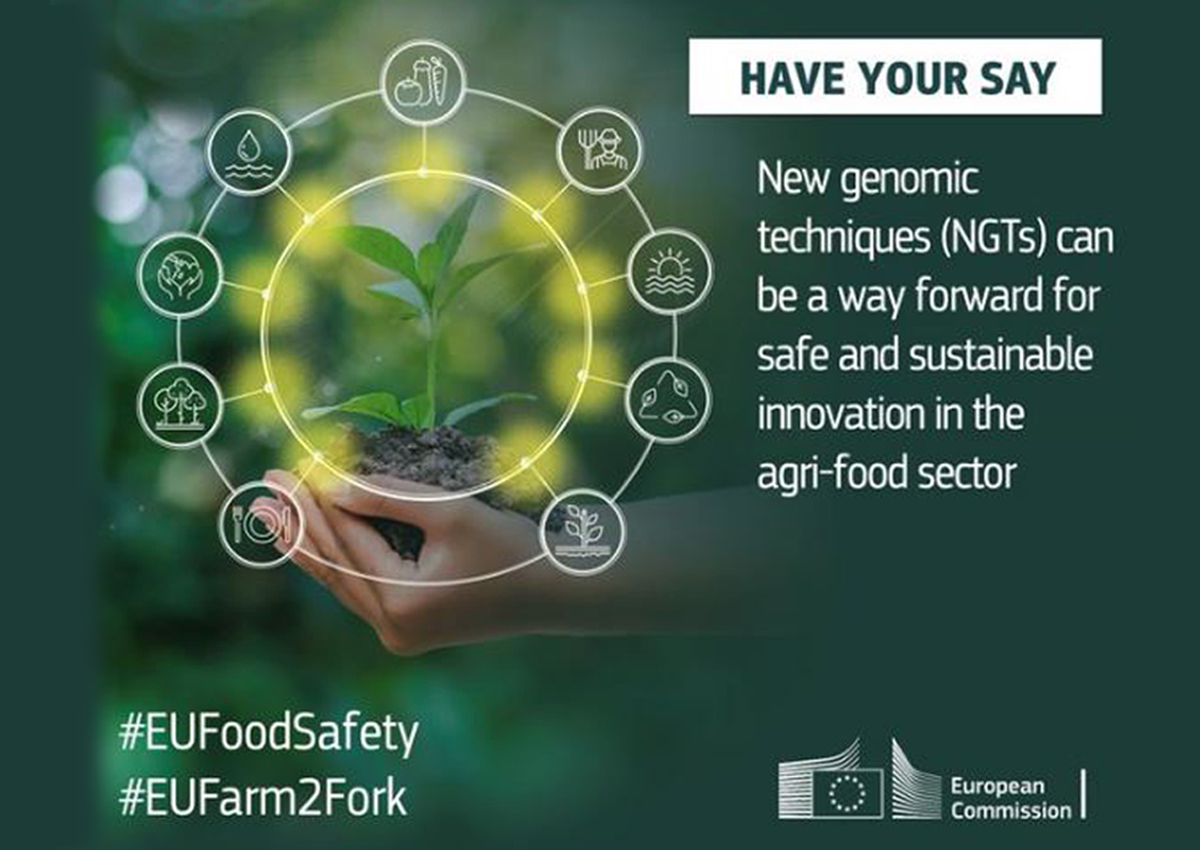A Short Timeline of EU’s Proposal on NGTs
| |
The European Commission released its proposals on New Genomic Techniques (NGTs) and Plant Reproductive Material (PRM) on July 5, 2023. The proposal, which was suggested by the Council of the European Union in 2019, will have a significant impact on Europe's seed companies, farmers, and vegetable growers. The proposal suggests that plants derived from targeted mutagenesis and cisgenesis be categorized separately from genetically modified organisms (GMOs) and also introduces a notification process for “conventional-like” category 1 plants to confirm their status.

In the last decade, many crops were developed using NGTs and modern biotechnology. To have a better understanding of recent advances, the Council requested that the Commission conduct a study on NGTs in November 2019. The request was to carry out "a study in light of the Court of Justice's judgment in Case C-528/16 regarding the status of novel genomic techniques under Union law." The results of the study were published on April 29, 2021, and discussed below.
2021 European Commission study
The study on NGTs showed that the techniques have the potential to contribute to a more sustainable food system as part of the objectives of the European Green Deal and the Farm to Fork Strategy. The study also found that the current GMO legislation adopted in 2001 is not fit for purpose for such innovative technologies.
The Commission's study included a scientific and market state-of-the-art analysis; clarification of the legal status of organisms produced by NGTs; state-of-play on the implementation and enforcement of the GMO legislation, as regards NGTs; safety and risk assessment considerations; overview of research and innovation in the field; EU countries and stakeholders' views on potential benefits/opportunities and challenges/concerns associated with NGTs and their products, labeling, Small and Medium Enterprises (SMEs), intellectual property; information on public dialogues and national surveys; and information on ethical aspects of NGTs and their products
The main findings of the study are:
- NGT products have the potential to contribute to sustainable food systems with plants more resistant to diseases, environmental conditions, and climate change effects. Moreover, the products can benefit from higher nutritional qualities such as healthier fatty acid content and reduced need for agricultural inputs such as pesticides;
- By contributing to the EU's objectives of innovation and sustainability of food systems, as well as a more competitive economy, NGTs can have benefits for many sectors of our societies;
- At the same time, the study also analyzed concerns associated with NGT products and their current and future applications. Concerns included the possible safety and environmental impact, for example, on biodiversity, the coexistence with organic and GM-free agriculture, as well as labeling;
- NGTs are a very diverse set of techniques and can achieve different results, with some plant products produced by NGTs being as safe as conventionally bred plants for human and animal health and for the environment;
- The study finds that there are strong indications that the current 2001 GMO legislation is not fit for purpose for some NGTs and their products and that it needs adaptation to scientific and technological progress.
2022 public consultation
In 2022, the Commission opened a 12-week public consultation which ran from April 29 to July 22, calling on civil society, public authorities, business operators, and everyone interested to provide their views on NGTs for plants. It sought to receive citizens' and stakeholders' views on the functioning of the current GMO legislation for plants obtained by targeted mutagenesis and cisgenesis and their food and feed products.

The public consultation was an important source of information, with results showing that 80% of the 2,300 participants from more than 50 countries view the existing provisions of the current GMO legislation as inadequate for plants obtained by the latest breeding methods such as targeted mutagenesis or cisgenesis. Applications of targeted mutagenesis are highly versatile and can be used in the development of a wide range of different plant products while the existing EU rules largely date back to the 1990s and are based on the scientific knowledge of that time.
The consultation also showed that a large majority of citizens, academia and research institutions, companies and business associations, public authorities, and the majority of trade unions support this view. On the other hand, only 17%, or those from environmental organizations, and a majority of NGOs and consumer organizations insist on keeping the current legislation in place.
New Proposal on NGTs to have a significant impact in Europe
After the study and public consultation, the Commission released a proposal to regulate NGTs. The proposed regulation will cover two categories of NGT products, including targeted mutagenesis and cisgenesis.
Currently, plants produced using NGTs are subject to the same rules as GMOs. Under the proposed legislation, plants produced using NGTs that could also occur naturally or by conventional breeding will be subject to a verification procedure, based on criteria set in the proposal. The plants that meet these criteria are treated like conventional plants and therefore exempted from the requirements of the GMO legislation. These plants will not require a risk assessment, and they can be labeled in the same way as conventional plants.
For all other NGT plants, the requirements of the current GMO legislation would apply. This means that they are subject to risk assessments, and they can only be put on the market following an authorization procedure. Detection methods and tailored monitoring requirements will be applied to these plants.
The new proposal only concerns plants produced by targeted mutagenesis and cisgenesis and their food and feed products. It does not include plants obtained by transgenesis, as such techniques remain subject to the existing GMO legislation.
Professional organizations, academic groups, scientists, and like-minded individuals welcomed the provisions of the new proposal. However, they also insist that balanced regulation should be in place “to take account of scientific progress and to envisage the development of these varieties at the European Union level without generating distortions of competition with the rest of the world.”

The proposal is open for feedback for a period of eight weeks, which is until October 4, 2023. All the feedback received will be summarized by the Commission and presented to the European Parliament and Council for the legislative debate.
In late July, EU’s Agriculture Ministers met to discuss the Commission’s proposal for the first time. The discussion saw many ministers welcome the Commission's proposed loosening of gene editing rules as a building block for sustainable farming, while others voiced concerns over potential risks. During the meeting, Food Safety Commissioner Stella Kyriakides said, “This proposal illustrates our commitment to give farmers the tools that they need,” which was shared by many of the Ministers:
- Luis Planas from Spain, who is the current chair of the EU Agriculture Council said that the proposal “is very important not only for the public but also for the agricultural sector," and added that it will show farmers that “we have problems to solve, but we are looking at alternatives to make progress”.
- Italian junior minister Luigi D'Eramo said NGTs represent “the most effective instrument that we have at our disposal in the agricultural sector to improve the sustainability of production.”
- France's Agriculture Minister Marc Fesneau hailed the proposal as an “important and long-awaited step.” Fesneau also called for swift progress on the file, which risks not being adopted before the EU elections in June 2024.
- By making NGTs available, “the EU's position on international markets is reinforced, and we can catch up with our competitors who already use these genetic techniques,” Finnish minister Sari Essayah said.
For further reading:
- European Commission Releases Proposal on New Genomic Techniques
- Frequently Asked Questions: Proposal on New Genomic Techniques
- EU Ministers Discuss Proposal on NGTs for the First Time
- EU Consultation Confirms Europeans' Support for Policy Change on Novel Genomic Techniques
- European Commission Study Shows Potential for Agriculture of New Genomic Techniques and Need for New Policy
| Newer Post | Archive | Older Post |
Science Speaks is ISAAA Inc.'s official blog. Weekly blog articles, authored by ISAAA writers, partners, and invited contributors, aim to help share, disseminate, and promote scientific knowledge and its vital role in achieving global agricultural sustainability and development. Your support to Science Speaks will help us achieve this goal. You can help us by donating as little as $10.

